Moving house for the first time can be difficult and confusing, especially in a foreign country. In particular, many people do not know what to do about their utilities. In Japan, tenants are the ones who make contracts for public utilities like electricity, gas, and water. Not only for the new place you are moving to, it is also the tenant’s responsibility to end the public utility contract at the place you are moving out of.
In this article, we will explain the procedure to set-up your utilities in Japan, as well as how to end them. Read this article carefully, and your moving home experience will surely go well.
Table of Contents
- Utilities in Japan are the Tenants’ Responsibility
- Procedure for Utilities in Japan: Signing and Cancelling Contracts for…
- The Costs for Electricity, Gas, Water in Japan and How to Save Cost
- Summary
Utilities in Japan are the Tenants’ Responsibility

Contracts on public utilities differ from country to country. In some countries, the landlord contracts the public utilities and the tenant pays the landlord the utility bills. Whilst in some countries, utilities are readily available once you move in. But in Japan, all procedures for electricity, gas and water are done by the tenant.
In Japan, you have to carry out your own procedures for electricity, gas and water when you move in. If you do not, you will find yourself not able to use any utilities. In some cases, the real estate company will have decided on the public utility company to be contracted to. But in some cases, you will need to decide on the contracting company in advance.
It is often more economical to combine electricity and gas contracts with a company that offers a set plan. For water, apply to the waterworks bureau with jurisdiction over your address.
Writer's Pick
Procedure for Utilities in Japan: Signing and Cancelling Contracts for Electricity, Gas, and Water

Here, we will introduce the procedures to enter a contract, and to cancel a contract for public utilities. We will go through electricity, gas, and water in turn. Be careful to note that apart from starting contracts for public utilities at your new place, you must also cancel contracts for public utilities at your old place.
Electricity
Without electricity, life in your new home would be very difficult. Making a contract on the day of moving is possible, but not having electricity will affect the moving process. Also, it will be very busy on the moving-day, so we recommend completing the contract procedure in advance.
Signing Electric Contract
Apply to the electricity company that you have chosen for a contract to start using electricity. You can apply by making a call or online. Major electricity companies have English translated web pages, so if you are not confident about your Japanese language skills, then definitely make use of them.
When signing up, you must also decide on the amperage (amount of electricity) you need. If the amperage is low, the price for your electricity will also reduce accordingly. However, if you set the amperage too low, the amount of electricity you can use at once will be limited and may cause inconvenience. As a standard, 30 amperage or more is good enough for someone living alone.
Once the contract procedure is completed, all you need to do is switch on the breaker on the day you want to start using electricity.
Cancelling Electric Contract
It is best to complete the cancellation procedure 1 week before you move out. As you will continue to use electricity up till the day you move out, set the contract to end on the last day you will be in your old place.
Gas
In Japan, gas is used in houses to boil water in kitchens and baths, except for “all-electric (オール電化)” properties where all energy is supplied by electricity. Depending on the type of kitchen stove installed, it may also use gas. There are 2 types of gas: city gas (都市ガス) and LP (propane) gas. Each has different usage fees, raw materials used, and supply methods, with LP gas tending to be more expensive.
Signing Gas Contract
Before anything else, check what type of gas is used at the property you are moving into. If the gas type is different from what you had, you might not be able to use your appliances, and will need to get new ones or change parts. Note that it is not possible to change the type of gas in a rented property.
Signing up for gas is easily done online. You will be asked for your phone number, address, and the date to start use (open gas tap). As opening the gas tap needs to be done in-person, it is best to schedule on the day you move in. On the scheduled day, someone will be dispatched from the gas company to turn on the gas and check the appliances.
Rarely do gas company staff understand foreign languages, so if you are worried about communication, it is best to call a friend who speaks Japanese to be with you on the day.
Cancelling Gas Contract
Likewise, it is necessary for someone from the gas company to turn off the gas supply. Most likely you will be needing to use gas until the last day, so schedule for it to be turned off on the day you move out.
Water
Unlike electricity and gas, water supply is managed by the local government. Therefore, it is the waterworks bureau with jurisdiction over your address that you need to contact to sign a contract or cancel a contract for water.
Signing Water Contract
Procedures for starting water supply are normally carried out around 3 days to 1 week before moving in, either through the waterworks bureau’s website or by calling the customer centre.
In most cases, you can still receive water supply even if you did not finish the sign-up procedure. In the unlikely event that you forgot to sign-up for water, just call from your new residence on the day you move in to get it done. Some people forget to contact the waterworks bureau because they can receive water supply anyway, but as long as you use water you need to be under a contract, so get it done as soon as you can.
Cancelling Water Contract
Cancellation of water supply should be done at least 3 days to 1 week before moving out. If you do not cancel your contract before moving, the waterworks bureau will not be able to keep track of who is using water at the place. This could lead to problems with the next tenant, so be sure to cancel before moving out.
Cost of Utilities in Japan and How to Save on Utilities
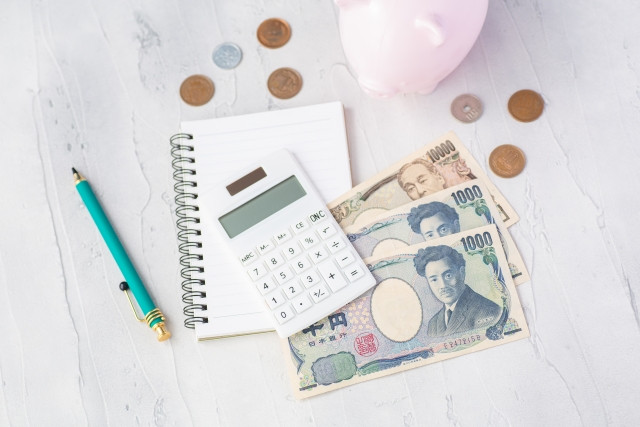
In this part, we will explain the approximate cost of utilities in Japan for someone living alone in Japan, as well as how to save on utilities costs. Note that utility rates vary by season and region, and so these prices should serve as a reference only.
In Japan, the term「光熱水費 kou-netsu-sui-hi」refers to light, heating and water utility costs, or in other words electricity, gas, and water costs. Additionally, since electricity and gas can usually be paid as a set, there is also a term「光熱費 kou-netsu-hi」for light and heating utility costs.
Electricity Bill and Tips for Saving Electricity
According to a survey by the Statistics Bureau of the Ministry of Internal Affairs and Communications, the national average electricity bill for a single-person household in 2021 was 5,482 yen. Compared to gas and water, electricity tends to be more expensive because it is used more frequently. If you are able to save on electricity, it would be a great help to household finances.
The biggest contributor to electricity bills is air conditioner usage. How much your electricity bill costs varies greatly depending on how you use your air conditioner or heater. In summer, instead of leaving the air conditioner on all day, try opening the windows in the morning and evenings to let in the cool breeze. And in winter, we recommend hot-water bottles, called “yutanpo” in Japanese. If you put a hot-water bottle under your covers, you can sleep warmly even without heating. There are also other heating goods you can use to keep warm.
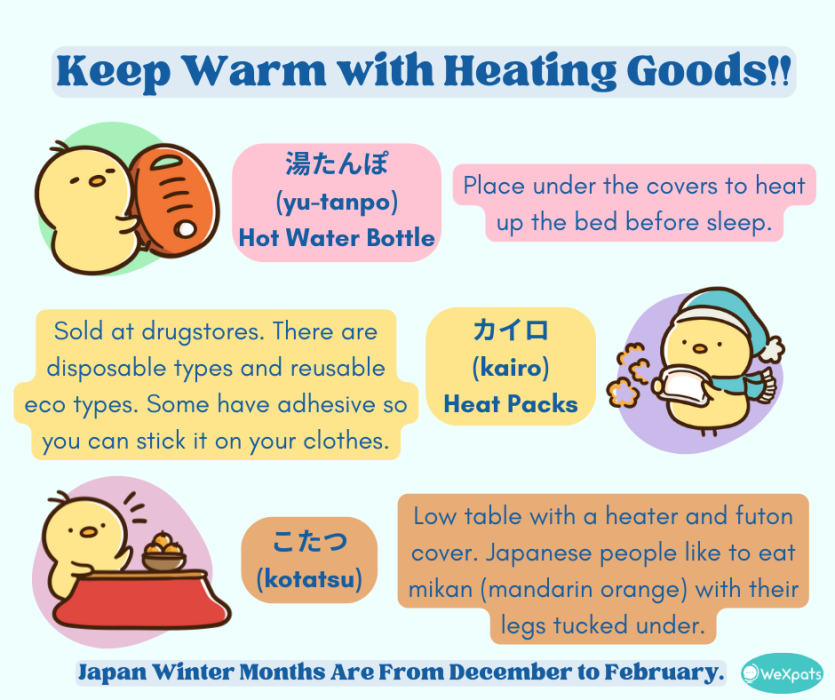
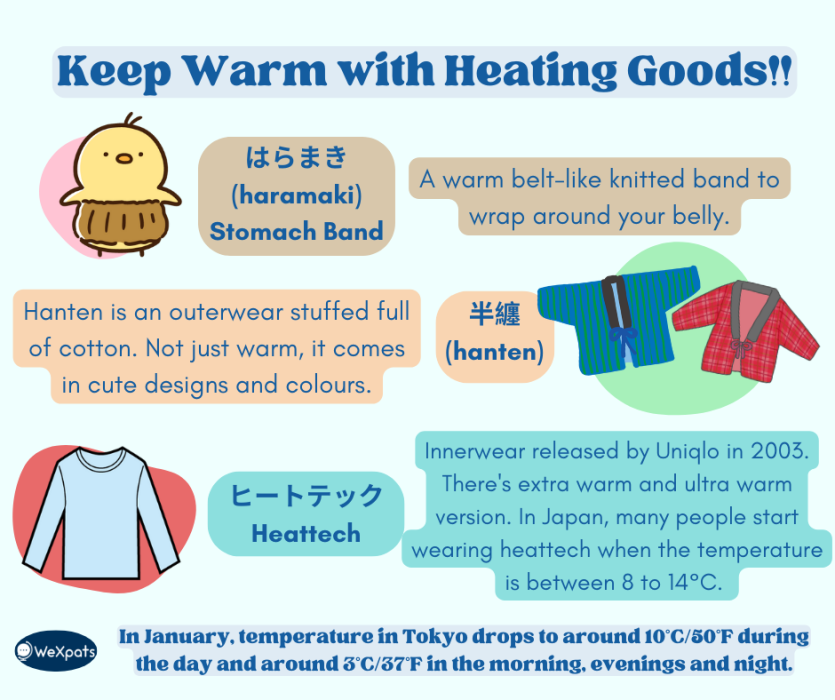
5 Techniques to Save Electricity during Winter in Japan
According to a 2022 survey by Panasonic targeted at Eolia (Panasonic air conditioner model) users, the average temperature setting of the air conditioner’s heater function was 25℃ (15.4%) from October to November when the weather became colder. Overall, the majority of users set their heater between a range of 22~25℃ (59.6%).
Panasonic's Air Meister, Fukuda Fuko, also introduced 5 techniques to reduce energy usage in Japan during winter, which we have provided in beautiful illustrations below.
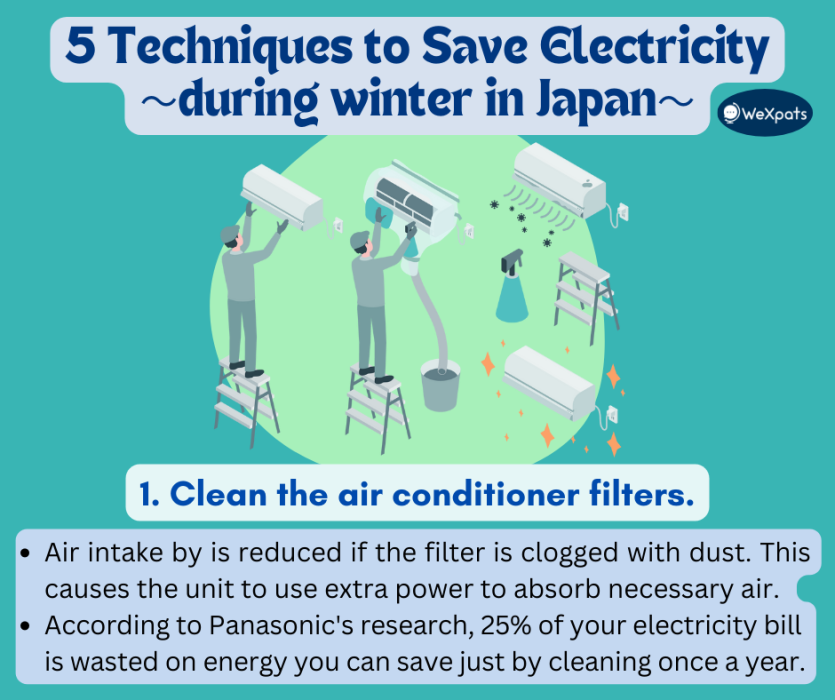
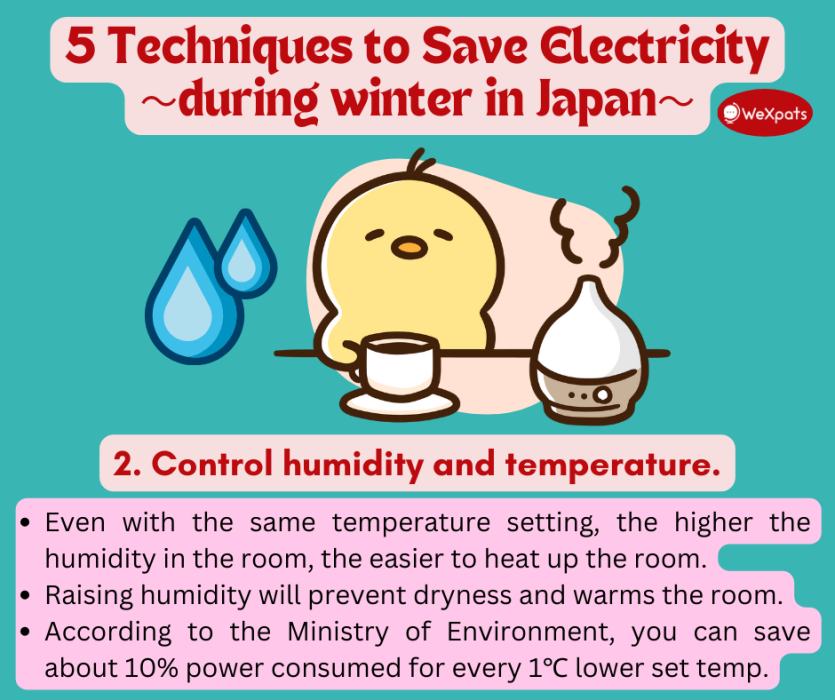
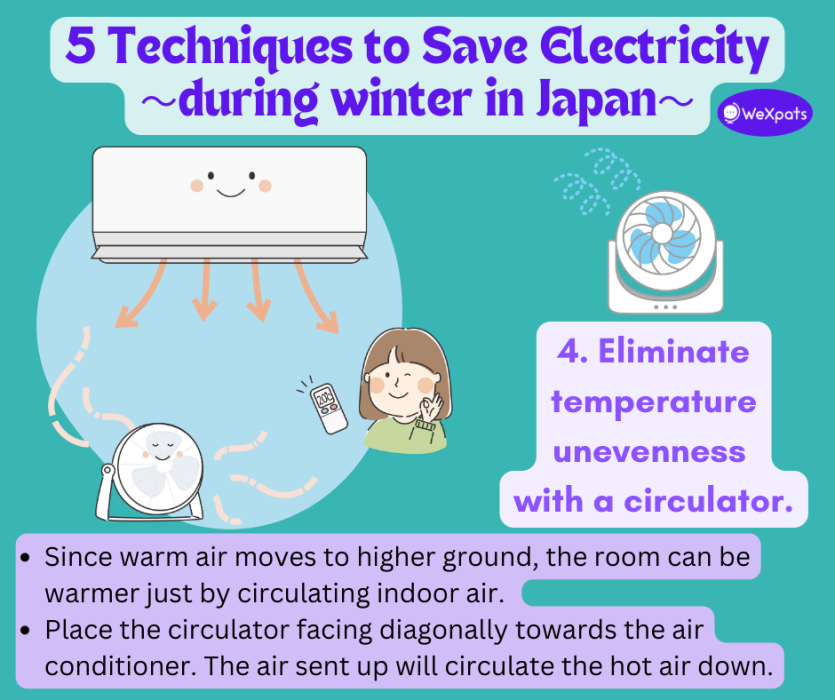
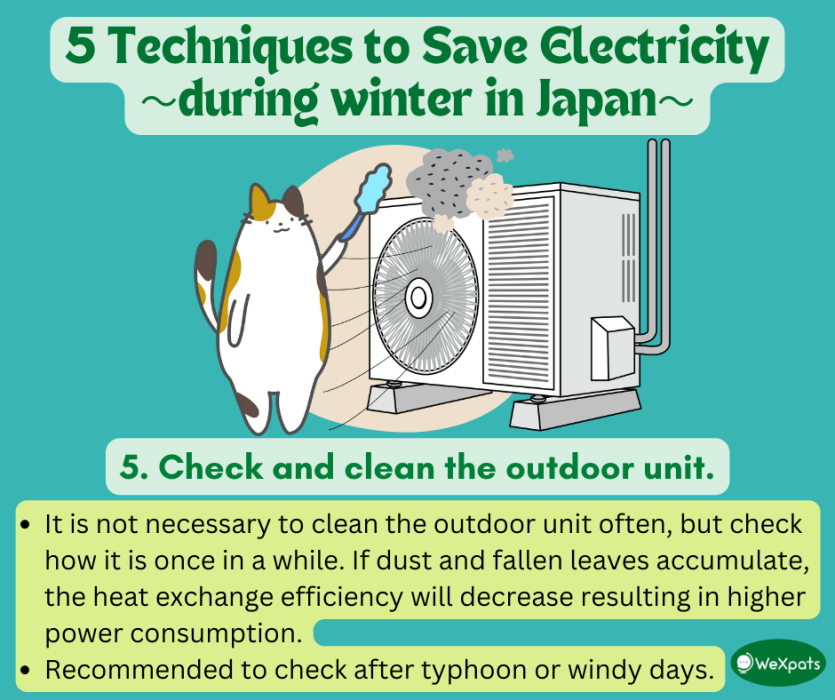
Facebook Link
※ Livedoor, “暖房が欠かせない冬 エアコン使用での電気代を節約する5つのテクニック”
Gas Bill and Tips for Saving Gas
According to the same survey, the national average gas bill for one-person households in 2021 was 3,001 yen. Gas is mostly used in the kitchen and bathroom. When cooking with a gas stove, be careful with the heat controls. There is little point in raising the heat so high that the flames stick out from the bottom of the pan. Even if you need a strong heat, having a stronger flame that stays beneath the pan is sufficient. Too strong heat may even damage your pan. Not to mention, rather than raising the heat that high, it is more effective, and in the long-run cheaper, to buy a good pan with even heating.
When taking a shower, turn it off when soaping up your hair and body to save on both gas and water. Running the water on maximum output also does not make much of a difference, it won’t help you shower faster and will simply be wasting hot water, so use it at a moderate output. And, if you have a bathtub, it can also help warm you up better during cold seasons than staying under a hot water shower - soaking in a bathtub with hot water saves on gas more than a 15 minute hot water shower.
And lastly, as we mentioned earlier, LP (propane) gas is more expensive than city gas. Another tip to saving on gas bills is to choose an accommodation that has city gas supply.
Water Bill and Tips for Saving Water
In Japan, the average water bill for a one-person household in 2021 was 2,248 yen. The biggest contributors to water bills are for bathing, laundry, and dishwashing.
There are washing machines that allow you to use leftover bath water. Reusing the water used in the bath can save a lot of money on water bills. Moreover, there are also baths that allow you to reheat the bath water.
When washing dishes, storing some water in a basin and adding detergent to it is better than letting the water run whilst you wash. In addition, it is also more effective to wash several dishes at one time, rather than washing each time after a meal.
※ e-Stat, “家計調査 家計収支編 単身世帯 (Income and Expenditure Survey on Single-Person Households”
To Summarise

In Japan, it is the tenant’s responsibility to make contracts with public utilities (electricity, gas, and water) when moving to a new place. The same responsibility applies to cancelling contracts for public utilities when moving out of an old place. These procedures can be easily done online, and multilingual support is available for some websites. Moving houses takes up a lot of time, so be sure to schedule time to arrange for your utilities.




















.jpg)















